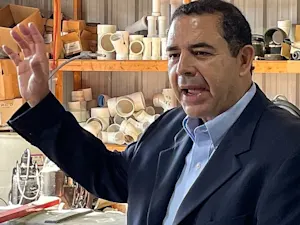
Ex-Congressman Won't Repay $374K: Santos Defiant
Official portrait of (former) representative George Santos (R-NY) for the 118th Congress. Photo courtesy of the U.S. House Office of Photography. Public domain.
George Santos, the disgraced former congressman whose prison sentence was commuted by President Donald Trump, has drawn a jaw-dropping comparison in his first interview since his release. Santos suggested that if Trump had pardoned Jesus Christ, critics would still have found fault. The remark, delivered on CNN's "State of the Union," has sparked a mix of incredulity and outrage, highlighting the deep divisions surrounding his commutation and the broader debate over presidential clemency.
Santos Compares Himself to a Martyr
In a moment that blended defiance with self-pity, Santos told CNN anchor Dana Bash that criticism of his commutation was inevitable. He said, "I'm pretty confident that if President Trump had pardoned Jesus Christ off of the cross, he would have had critics," as reported by PEOPLE. Santos portrayed the backlash as a sign of the country's polarized nature rather than a judgment on his own actions. "People are going to hate me," he said, adding that the reality of the country is that no clemency decision escapes controversy.
The comparison to a religious figure crucified for his beliefs has drawn sharp reactions. Critics see it as an audacious attempt to recast Santos's narrative from convicted fraudster to victimized martyr. The remark invites a jeer for its grandiosity and a sneer at the audacity of equating a convicted criminal with a figure of profound historical and spiritual significance.
The Facts Behind the Commutation
Santos was convicted in August 2024 on 23 federal charges including wire fraud and aggravated identity theft. The charges stemmed from a sprawling case involving embezzlement from campaign donors and unauthorized credit card charges. He was sentenced to seven years in prison but served less than three months before Trump commuted his sentence, releasing him immediately.
Trump announced the commutation on his social media platform, Truth Social, claiming Santos had been "horribly mistreated" in prison, including long stretches in solitary confinement, as reported by PEOPLE. Trump praised Santos for his "courage, conviction, and intelligence" in always voting Republican, framing the commutation as a second chance, according to NBC News.
Santos Sidesteps Restitution and Challenges Critics
While Santos publicly expressed a sense of humility and a desire to pursue prison reform, his stance on restitution to victims reportedly remains ambiguous. When asked on CNN if he would repay the nearly $374,000 ordered by the court, Santos said he would "do my best to do whatever the law requires of me," as reported by PEOPLE — but stopped short of committing to full repayment. He emphasized that he had only been out of prison for two days and was still processing the situation, as reported by NBC News.
In a separate interview on Fox News, Santos claimed he no longer had any legal obligations related to restitution or probation, calling much of the restitution "insane," as reported by NBC News. This stance suggests a narrative of defiance and reluctance to fully accept the consequences of his crimes, even as he publicly thanks Trump for the clemency.
The Political and Public Fallout
Santos's commutation has ignited a firestorm of debate about the use of presidential clemency. Critics fear that such acts may be perceived as political favoritism, undermining public trust in the justice system. Senator Richard Blumenthal, a frequent Trump critic, called the commutation "fabricated nonsense" and said there was no excuse for it, as reported by NBC News.
Meanwhile, Navy veteran Richard Osthoff, who accused Santos of pocketing money from a GoFundMe campaign for his dog's surgery, expressed shock and disgust at the commutation. "My gut dropped; I felt like I was going to throw up," Osthoff said, as reported by NBC News.
Santos, however, dismissed predictable outrage. He accused his critics, predominantly on the left, of "pearl clutching" and making a big deal out of the commutation, as reported by PEOPLE. He defended Trump's constitutional authority to grant clemency, noting that presidents have plenary power to commute or pardon at sentences at their discretion.
Santos's Attempt to Recast His Story
Despite the controversy, Santos portrayed himself as humbled by the experience and interested in prison reform. Yet, his refusal to unequivocally accept responsibility for restitution and his comparison to Jesus Christ suggest a complex effort to reshape his public image. He appears to be walking a tightrope between acknowledging his fall and positioning himself as a victim of political persecution.
The former congressman's comments reveal a man aware of the spectacle surrounding him and eager to control the narrative. His invocation of a religious martyrdom metaphor is a bold attempt to frame his commutation as a form of redemption, even as many see it as a political favor that undermines justice.
What Lies Ahead?
As Santos navigates life after prison, questions remain about whether he will fulfill his legal obligations and how he will rebuild his reputation. His case highlights the tensions inherent in presidential commutations, especially when they involve high-profile political figures with controversial pasts.
For now, Santos's comparison to Jesus Christ off the cross stands as a provocative symbol of the polarized reactions his commutation has provoked. Whether seen as a defiant comeback or a cynical ploy, his story is far from over.
References: George Santos Speaks Out in First Interview After Prison Release | Former Rep. George Santos says he will only pay restitution if he's required by law






















